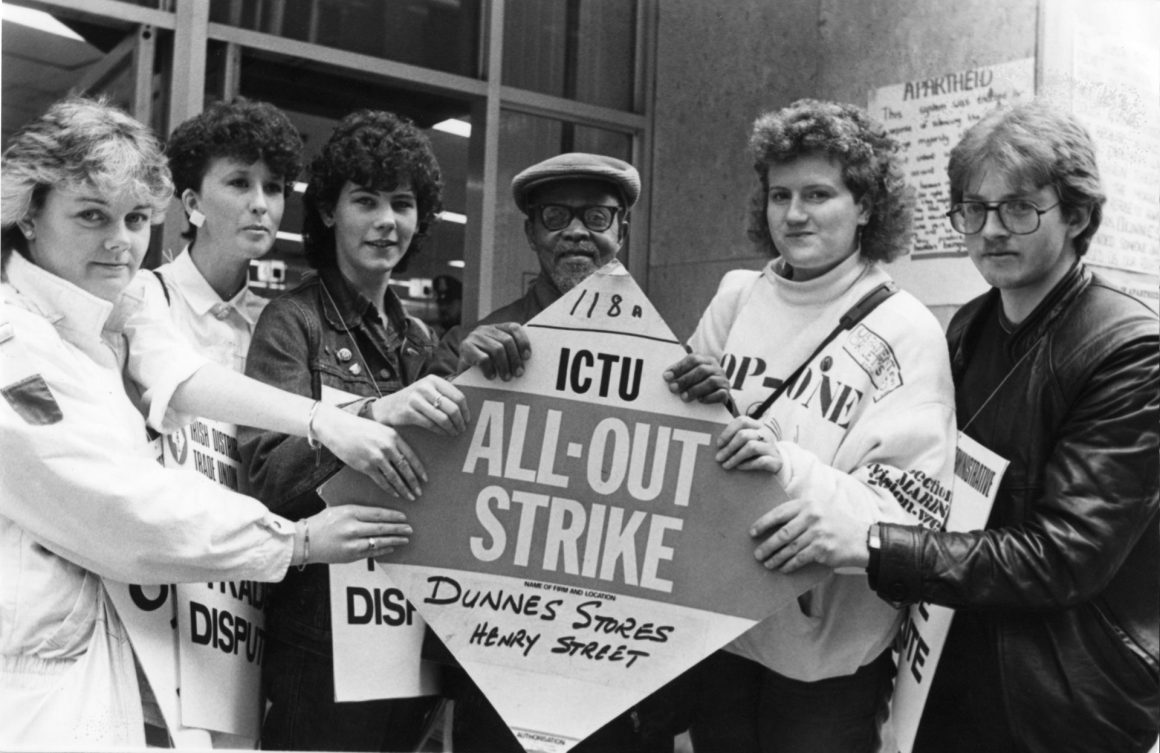“Then here’s to the girls of Dublin City who stretched their hands across the sea,
Their action surely is a lesson in workers’ solidarity.
And here’s to the folk who heeded the boycott, who won’t buy Cape and spurn Outspan,
And also the lad who joined the lasses – ten young women and one young man.”
Ten Young Women And One Young Man, written by Ewan McCowell
This year marks the 40th anniversary of the renowned stand taken by nine Dunnes Stores workers, nine of whom were in the Henry Street branch, in observing their union’s policy of refusing to handle South African produce in opposition to the then-apartheid regime.
The basic facts of the strike have been well documented at this stage and are widely available online. The Socialist spoke to Karen Gearon, who participated in the strike, about some of the less well-covered angles and the strike’s renewed relevance 40 years on:
Tell us something about the work regime in Dunnes and how it contributed to the desire of you and fellow workers to stand up to management?
I suppose when we were working there we, as all young women, had to put up with management who were typically young men in suits who daily mistreated us. For example, we were only allowed two timed toilet breaks twice a day, keeping in mind that we had to travel six floors up from the basement. We were sometimes followed into the bathroom. Our bags were searched frequently, which was not an unusual occurrence at the time in workplaces but they used to try to embarrass us by taking out sanitary products, for example. Management would hover over us at the tills. We were made to buy our own uniform. Inspections took place to make sure we were wearing regulation tights and not socks requiring us to lift our skirts. They were abusive in meetings. The store was cold where we worked.
So there was a build-up of grievances. They never formally recognised the union but recognised but we felt that there was power in the unions and we didn’t have the Industrial Relations Act and the balloting laws that came in afterwards.
You and others described how your appreciation of the realities of apartheid grew after the strike commenced. Can you say something about that?
We knew next to nothing about apartheid and couldn’t spell the word when the dispute began. We new of discrimination against black people in South Africa, and the union (then called IDATU, now Mandate) passing conference motions backing the non-handling of South African produce. The strike started because of the position management put us in when we observed the boycott. They forced the issue by suspensions forcing us then to escalate with a walkout. Had management turned a blind eye it might have fizzled out or something else would have triggered a struggle .
Only when we got to meet people who supported our stand, including and especially Nimrod Sejake (ANC activist who was living in exile in Dublin) that we become educated quite quickly with what was at stake.
How was the struggle sustained for so long two years and nine months, particularly given the discouragement from some quarters that should have been fulsome in their support throughout?
There was a realisation that the most that could happen was the loss of our jobs. In large measure, we were sustained by support from activists from the Militant Tendency (predecessor of the Socialist Party), the Socialist Workers’ Movement, Sinn Féin, Afri, etc. A leading person of the Irish Apartheid Movement, Kadar Asmal, was not supportive. I described him as the “wine and cheese” anti-apartheid, whereas we were ‘street’- based anti-apartheid.
We felt the responsibility of showing the black people in South Africa that we were not going to tolerate being complicit in their oppression. When the South African authorities expelled us on arrival during a planned visit they did us a favour because the profile internationally of the struggle skyrocketed, which helped sustain us.
The strike is being recalled no just in the context of the 40th anniversary but also in the context of the genocide in Gaza and the question of what unions and union members can do to show their support besides attending demonstrations?
Unions have been incredibly quiet besides being present on demonstrations and social media. None are leading on this, which I find disgusting. We need an organised boycott of Israeli produced goods. Even a one hour national strike which is actually happening in Israel regardless of the motivations of that strike. In the absence of a lead from the top we need to support and encourage any action from below on this in workplaces.












